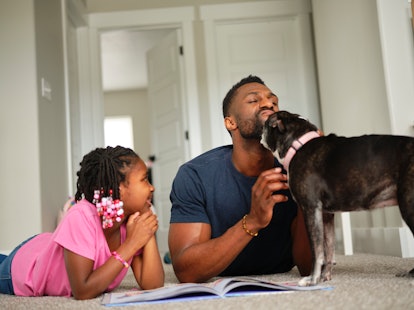
[ad_1]
If you have a pet and are expecting a baby, you may have discussed what to do if your dog or cat is jealous of your new dog or cat, but we always talk about the opposite. I’m not taking that into consideration. As your child grows, you may notice that your toddler or child exudes envy when it comes to dogs, even though your pet is perfectly fine with the family structure. If you notice your child is jealous of your dog or cat, here’s why and what to do about it, according to experts. Life would be a lot easier (and cuter) if they were already just best friends.
My son Cooper is almost 3 years old, and for most of second grade he was a two-legged terror to our dog Zelda. Whenever I wasn’t giving him my full attention, his son seemed to slap the dog or scream at his daughter to get my attention. He would throw a tantrum if I had to stop playing with him so he could feed her or pee. He overreacted to everything she did. Once, when she walked behind him without touching him, he crouched on the floor and screamed, “My back!” It never occurred to me that he might be jealous of the attention we were giving him until one day he came up to me asking for a pet and he said, “No, Mom!” It was.
When I started researching, I realized I wasn’t the first parent to witness the toddler vs. dog jealousy dynamic. When she told the story at work, her coworkers said that her children, ages 10 and 13, also felt jealous when she brought home the new puppy. So what is given? And how can you keep the whole family (pets and humans) happy?
What are the causes of jealousy in children?

Whatever you pay attention to, whether it’s your pet, your partner, or your sibling, will catch your child’s attention and appear to be competing with them. Experts say that’s actually somewhat to be expected.
“It’s normal to feel some jealousy when kids aren’t paying attention,” says Dr. Dan Marlo, a pediatric psychologist at Children of Alabama. “This could be due to a new pet, a new brother or sister, or mom or dad being busy. So the question is not whether the child is jealous, but how to handle this emotion in a healthy way. It’s about teaching you how.”
Feeling jealousy isn’t limited to young children, Marlo said. “Everyone is susceptible to jealousy. Older children, teens, and adults may feel jealous when they feel their emotional needs are not being met. This is where awareness comes into play. It can be a big factor: a person might be getting as much attention as usual, but not feeling like they’re getting the attention they need. , reassuring them and teaching them how to control their emotions is key.”
This strange economy of attention can even affect families with much more extensive animal socialization. Ellie Lacks, an animal communicator and founder of The Gentle Barn, a nonprofit animal rescue and rehabilitation organization, has been caring for dogs, cats, and other animals that she has to care for every day since her son was a toddler. He says he began to feel resentful towards other animals. She hired a babysitter because she couldn’t take care of her son and them at the same time, but from her son’s perspective, she needed her son to spend time with the animals. I had left it to someone else. When her daughter started doing things like pulling her dog’s ears and tail, she felt she had to do something. To keep everyone safe.
“I obviously had no intention of getting rid of the animals. They were family, just like him. But I had to strike a balance and come up with a plan that would make both the animals and my son happy.” I didn’t,” she says.
How can you foster a positive relationship between your child and your pet?

If you think your child is jealous of your pet, you can make a difference, although it may take some time and effort. Marlo recommends:
- Spend special time with your kids and give them your all. This may take her from 5 minutes to 10 minutes.
- Reassure your child that they are important in the family, but remind them that pets deserve attention as well.
- Involve your child in caring for your pet in an age-appropriate manner. That might mean feeding, watering, bathing, and cleaning the cat box. This teaches children empathy, compassion and responsibility, and promotes self-esteem, Marlo added.
- Stay the course. Give your child and pet time to get through this stage. Supervise and redirect as needed, but allow them to be friends. Jealousy is just part of the process, Marlo says.
Lux says hiring a trainer to teach your dog new commands may also be helpful. Having a dog that understands things like “sit,” “stay,” and “place” can help your child and dog distance themselves from each other when needed.
Lacus has another tip that I tried and it made a huge difference for my son. “When my kids were little, I would say to the dog, ‘Okay, let’s go out in the garden,'” she says. “Now I’m going to focus on the kids, so let’s play together.” . After about a week of her telling the dog, “It’s Cooper and Mommy time,” in front of her son, letting him play outside, and giving him her undivided attention the entire time, her jealousy is basically over. It seems to have disappeared.
Of course, until your pet and child get along, it’s best to carefully monitor their interactions with your child, and if that’s not possible, keep them separate. Not only can a toddler’s slap hurt your pet, but an animal’s bite or scratch can seriously injure your child. While it can be frustrating to constantly switch up entire family members, Lux says it’s important to remember that you don’t have to be a referee forever.
“It was a lot of stress and hard work, but I had to keep reminding myself that he was getting older. This is not my forever,” says Lux. “I think a lot of people are abandoning their dogs in shelters because the judgment between children and animals has become so diluted that they don’t want to interact with them.” We want all of you to have the resources to set yourself up for success so you don’t have to go back and your child feels fulfilled.”
Expert:
Dr. Dan Marlo, Pediatric Psychologist at Alabama Children’s Center
Ellie Lux, animal communicator and founder of Gentle Barn, a non-profit animal rescue and rehabilitation organization
[ad_2]
Source link







